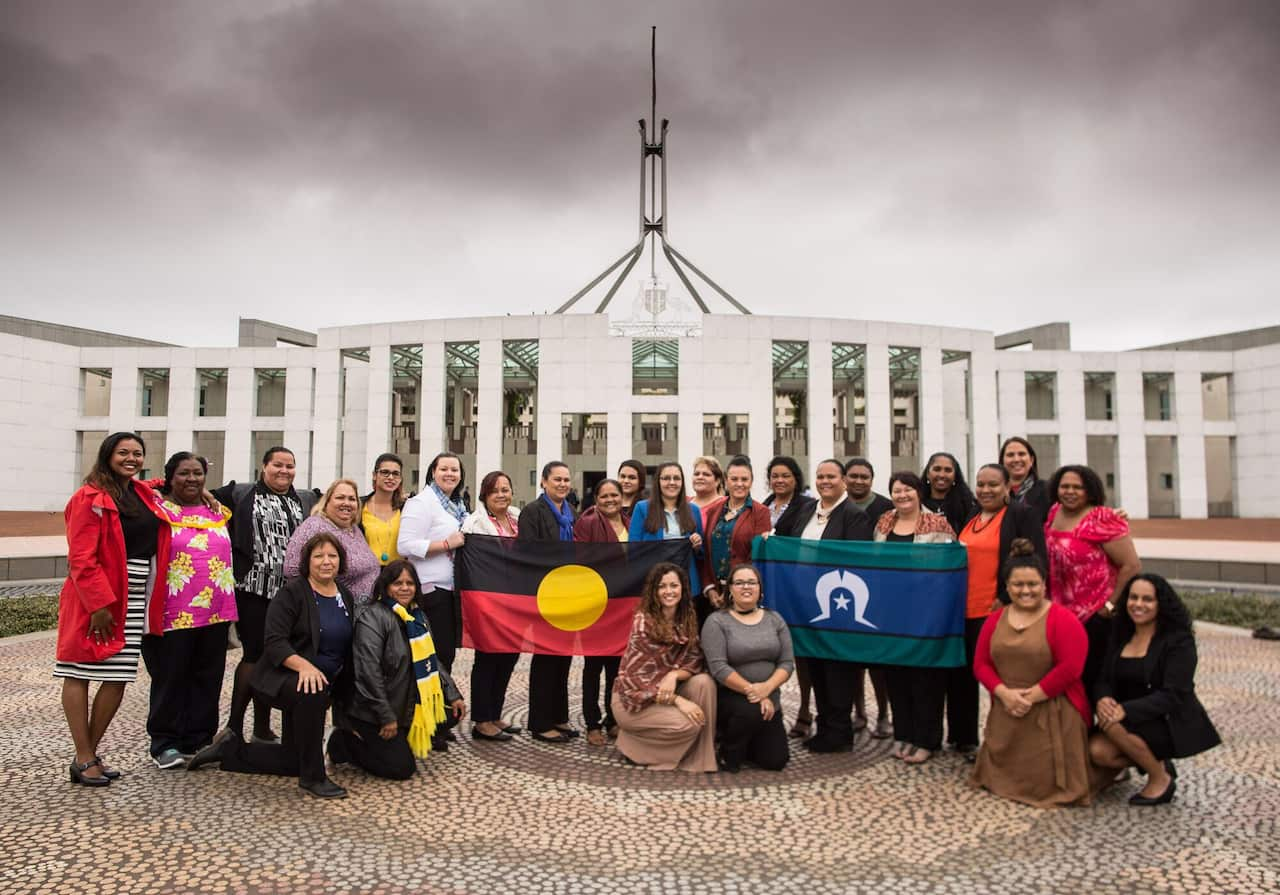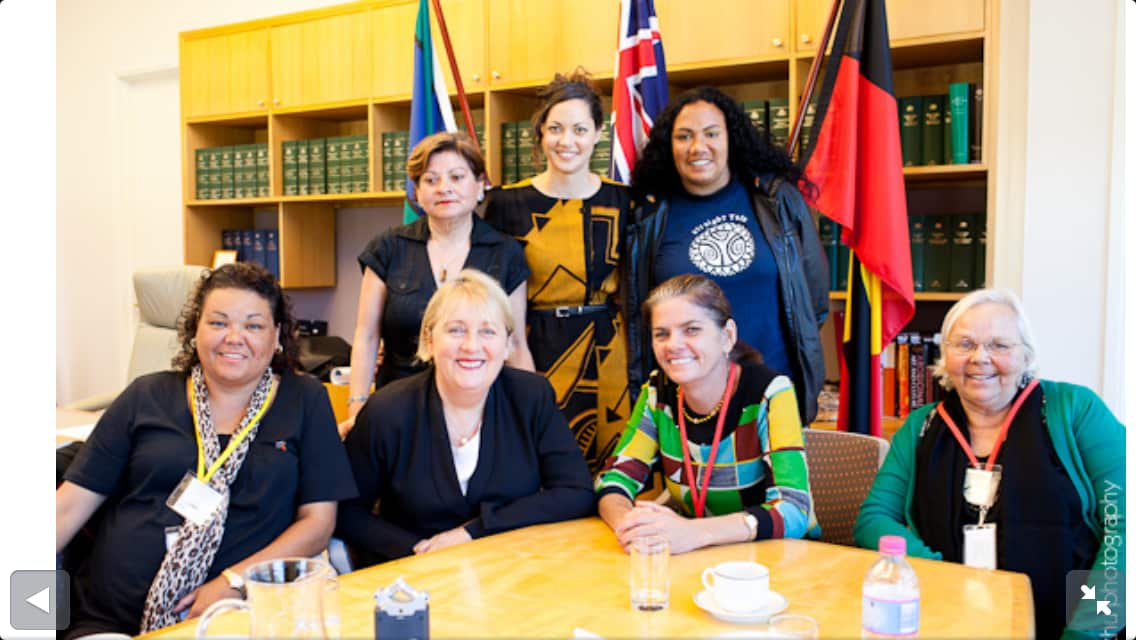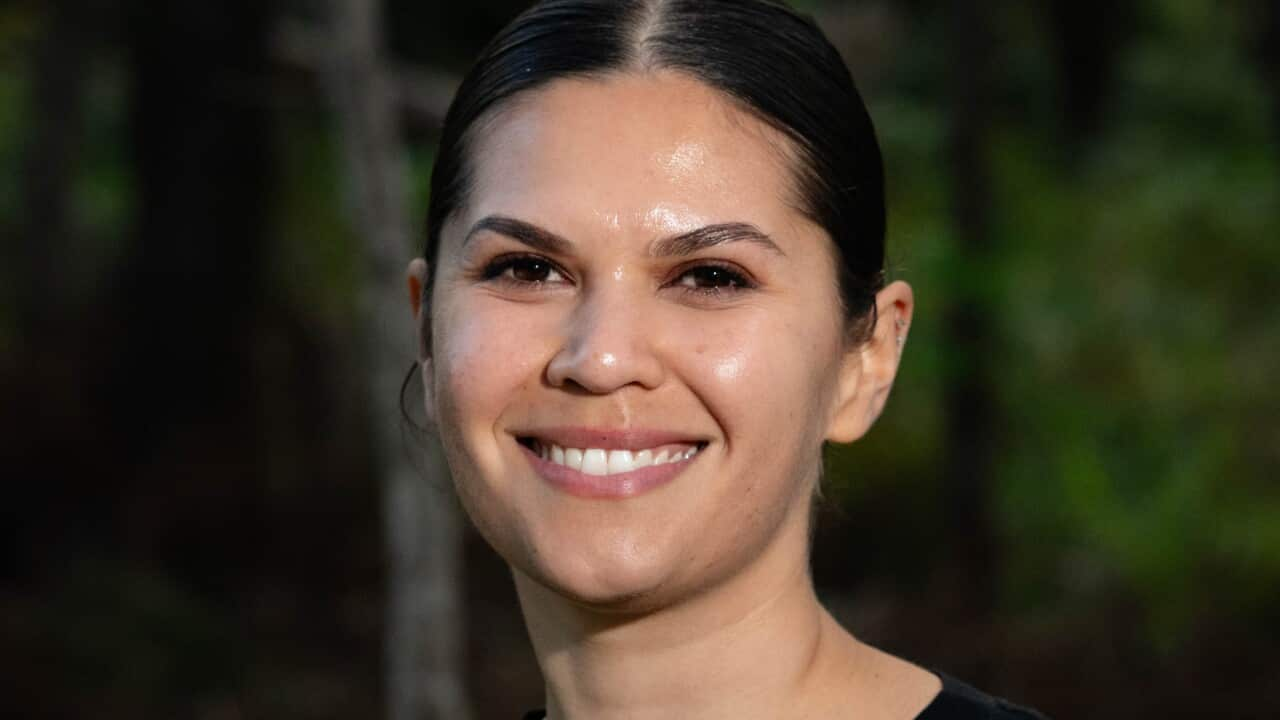Carla McGrath is a proud Torres Strait Islander and one of our countries next generation of young Indigenous leaders. She’s also a strong, articulate and resilient woman who has been working relentlessly in various Indigenous policy positions to ensure Aboriginal and Torres Strait Islanders people have fair and equal access and opportunity to all areas of society.
Her family hail from Kubin (Moa Island) and Waiben also known as Thursday Island. While she was raised on the mainland, it’s clear she has a strong sense of connection to the Torres Straits.
“It’s only really other Indigenous people that I’ve spoken to who can ever fully understand or describe what it feels like to put your feet in that sand of the place that you come from, and just feel instantly at home, and belong even if that’s not where you’ve been raised.” “I think I was really lucky to have two parents who once they were separated, made sure that I had connection back there. And so, I got sent from quite small on that plane, often by myself, up to spend time with family up there. Particularly, while my dad was still living there, but even after he moved back down to the mainland as well.”
“I think I was really lucky to have two parents who once they were separated, made sure that I had connection back there. And so, I got sent from quite small on that plane, often by myself, up to spend time with family up there. Particularly, while my dad was still living there, but even after he moved back down to the mainland as well.”

Carla McGrath during her childhood. Source: NITV
Carla’s childhood memories of time spent going back home are firmly etched in her mind.
“My dad’s property was on Prince of Wales. And this, for people who know Prince of Wales, it’s not roads and shops and infrastructure, it’s just one long stretch of beach. Long Beach, on the other side of Prince of Wales and dad built the house himself.”
“So, my memories are of this kind of ever evolving structure that started as a roof which he made sure got on when I was young, and then grew into what he had as a family home up there. But I just used to run around like a crazy little wild child, and fly, and swim in the ocean, and have an enormous amount of freedom and access to nature that didn’t come with living in the inner west of Sydney, that’s for sure.”
She says many aspects of Torres Strait Islander culture have helped her to grow. She draws great strength and inspiration from her ancestors and particularly the strong women in her life.
“I think too in our family, you know my grandmother and my great grandmother were incredibly strong women who did a lot in their communities, and their names. I mean, my great grandmother the hostel on Thursday Island is named after her, because of the work that she did in creating space for Torres and Islander who are passing through to have somewhere to stop and stay.” “So, there is a legacy of strength of female role models that I think I draw a lot from. And that’s a strong part of our culture going back from, you know since the beginning. We’re a warrior people, I think that definitely flows through my family line, and 100% into me. I think some people can often think that I’m a little bit softer than I am, but when push comes to shove that definitely shines through.”
“So, there is a legacy of strength of female role models that I think I draw a lot from. And that’s a strong part of our culture going back from, you know since the beginning. We’re a warrior people, I think that definitely flows through my family line, and 100% into me. I think some people can often think that I’m a little bit softer than I am, but when push comes to shove that definitely shines through.”

Carla McGrath's grandmother is an inspiration to her. Source: NITV
It’s clear that McGrath is strong willed, passionate and driven to make a difference for her people, following the path carved out by those who have come before her. It’s a legacy that has impacted her profoundly and has ultimately led to various roles including her current position with the independent activist group GetUp.
“I had the chance to really be involved in opportunities that were about not just creating change from education, or other spaces, but also around creating narrative change. Which we’d say, the language that’s used around Aboriginal and Torres Strait Islander, and people shift from what we see so often in media outside of our own media. What we see used by the general Australian population when it comes to us to start to recognize and celebrate the uniqueness of us in our own country.”
“I think the GetUp role was an intentional shift into a different gear. So, I was fortunate to be raised by parents who are pretty politically and socially motivated, and therefore, that kind of advocacy and activism, has been part of the way that I’ve been raised. And at this point in my life, I felt it was really necessary to put a lot of energy into that. Into a slightly more forthright version of that than I’ve maybe had in some of the other positions that I’ve had previously in my career. I think it’s time for that now, for me.”
McGrath says through her involvement at the Board level with GetUp she is hoping to create a shift in terms of a greater level of diversity within the organisation and the inclusion and primacy of Aboriginal and Torres Strait Islander voices across all sections of the work done by the group. “We don’t just advocate on issues that are just about ourselves. But we are so linked to our country, and everything that happens with our country and our society, that our perspective, and our skill, and our capacity, should be in every single one of those conversations. So, certainly I think the work that we’re doing at GetUp to ensure that First Nations voices, that Aboriginal and Torres Strait Islander voices are in every single one of those campaign spaces, is what I hope to grow organizationally, but then sector wide.”
“We don’t just advocate on issues that are just about ourselves. But we are so linked to our country, and everything that happens with our country and our society, that our perspective, and our skill, and our capacity, should be in every single one of those conversations. So, certainly I think the work that we’re doing at GetUp to ensure that First Nations voices, that Aboriginal and Torres Strait Islander voices are in every single one of those campaign spaces, is what I hope to grow organizationally, but then sector wide.”

Carla McGrath with Indigenous women at Parliament House Canberra Source: NITV
While McGrath sees herself making a meaningful contribution to the work of GetUp and advocating for issues on behalf of First Nations people, she was also hoping to bring an Indigenous voice and representation when she was appointed as a public member to the Australian Press Council in 2017.
The Australian Press Council is the principle body with responsibility for responding to complaints about Australian newspapers, magazine ad associated digital outlets.
“The chair at the time was trying to diversify the public voices, so that those adjudications, if they were coming from communities, of diverse communities, obviously which exists within our country, we’re a very diverse country. That those voices were represented in the adjudication processes as well.” “So, I saw it as a chance to almost for one of the first times, the second actually, ensure that there was an Aboriginal and Torres Strait Islander voice, in that process.”
“So, I saw it as a chance to almost for one of the first times, the second actually, ensure that there was an Aboriginal and Torres Strait Islander voice, in that process.”

Carla McGrath with former Indigneous Affairs Minister Jenny Macklin and other Indigenous women at Parliament House Canberra Source: Supplied
However, soon after McGrath’s appointment to the Council, News Corp and in particular The Australian newspaper, refused to work with the Council while McGrath was on it because of her role with GetUp. Subsequently, The Australian published several articles attacking her appointment, which left her feeling incredibly disappointed.
“There was such good will on the part of the Press Council when I first joined to do exactly what it was that I described, to ensure diversity in those adjudication processes. And I think, particularly with the Murdoch press, having such wide readership, such wide audience, including very diverse communities, I would have hoped that they would have seen that as an opportunity for them, as well as for the Press Council, and for the public. So, I was disappointed at the reaction.”
With pressure mounting, McGrath said she was asked by the Press Council if she would resign from her role at GetUp or resign from her role on the Council. She refused, as she didn’t see there was a conflict of interest serving on both organisations.
“And that’s why I didn’t step down. That’s a voluntary role that I hold at GetUp, the role of both boards is to ensure the organisational structures, and the fiscal responsibilities of organisations are being managed and taken care of, and that the vision of those organisations is being adhered to. I don’t get paid for that work, and in that sense, I feel that it was an unnecessary lens that was cast on a certain section of the political landscape, and not necessarily on others.”
“I think if members of the Press Council are able to be members of political parties, or donators to political campaigns, in their own political space, then that is their business. And for me to have a voluntary role overseeing the vision and the organisational assuredness, of an organisation like GetUp, should be allowed, should be afforded to somebody like me as well. I didn’t ever agree that those two things could not, that I couldn’t wear two hats in the same way that other people can wear two hats.”
In the face of public criticism, McGrath stood her ground with the support of family and friends.
“I’m incredibly lucky to have a really good network of people. I found it was one of those situations where you probably don’t even recognise. I certainly hadn’t given any forethought to sort of securing my boundaries, or closing the drawbridge, and having a safe space to retreat to should those things happen. I will do in future, definitely.”
“And what I learned through that process was just how many people are willing to support you and be there for you when you need it. So, I got lots of calls and messages of support from a great number of people. And I have a trusted few that I was able to go to, to check my thinking, and to test where I felt my decision making was going. So, that helped me ensure that I was maintaining a sense of integrity to myself in my own decisions, but also is that I wasn’t completely off the mark. And the advice that I was given at the time, gave me some assuredness about that.”
“One of the most difficult things was certainly seeing the impact that it had on my family, whilst they are incredibly supportive of everything that I do. And you know, Mum cut out a few articles and stuck them on the fridge as you do. The calls that I got from my family were very much checking on my well-being, and they were upset. That was hard, the was really hard.”
With McGrath refusing to step down or resign from her position as a public member on the Council or to resign from GetUp, the Council took steps in accordance with its Constitution to remove her from the organisation.
“I stood there until that policy was enacted, and there was a vote to remove me from the council. I felt that was really important for a number of reasons. Not least of which being, a younger woman in this space, and that being the first time that I’d ever been out in the public very much. A lot of the work that I often do is behind the scenes, which I really enjoy.”
“It was the first time I was publicly challenged, and I felt it was really important to make that stand to maintain my integrity in that process. And however, difficult it was, that’s what I did.”
The Press Council announced in August 2018, that they had removed McGrath as a public member because her position as Deputy Chair of GetUp was incompatible with her continued role as a public member of the Council.
At the time, the Press Council Chair Neville Stevens said it was the best outcome in a very difficult situation. He went on to say, “Carla McGrath, as a respected member of Australia’s Aboriginal and Torres Strait Islander community, would have brought an important perspective to the work of the Council. While the Council is committed to increasing diversity among its members, there is an overriding need for it to be independent and to be seen to be independent.”
McGrath concedes that the pressure she was under at the time was due to her position with GetUp.
“The reality of an organisation like GetUp is that the way that it’s structured, it really harnesses the power and the voices of its members, the people. And, I think for some in the political space, that can be somewhat disconcerting thing. Particularly, if what that membership, and what the power of those voices is saying, is at odds with their vision, or their values, when it comes to where this country should go, and how the country should be run. So, I do think that had a lot to do with it.”
After all the controversy and headlines over her experience with the Australian Press Council almost 2 years ago, Carla has now been appointed as Chair of GetUp and is adding her voice to several conversations in an effort to improve the lives of all Australians. Her wish for First Nations people is simple, yet thoughtful.
“To take our rightful place in this country, our unique place in this country. I have had the immense privilege of being able to travel to lots of different places and hear lots of different stories in the work that I’ve done, and I just feel we are less as a country for not knowing those stories, and placing them as a central part, and at the forefront of our national narrative.”
“There’s nowhere else in the world like here, and there are no other people like us. That’s a phenomenal story to have, and I would love to see us put that to the very forefront.”










